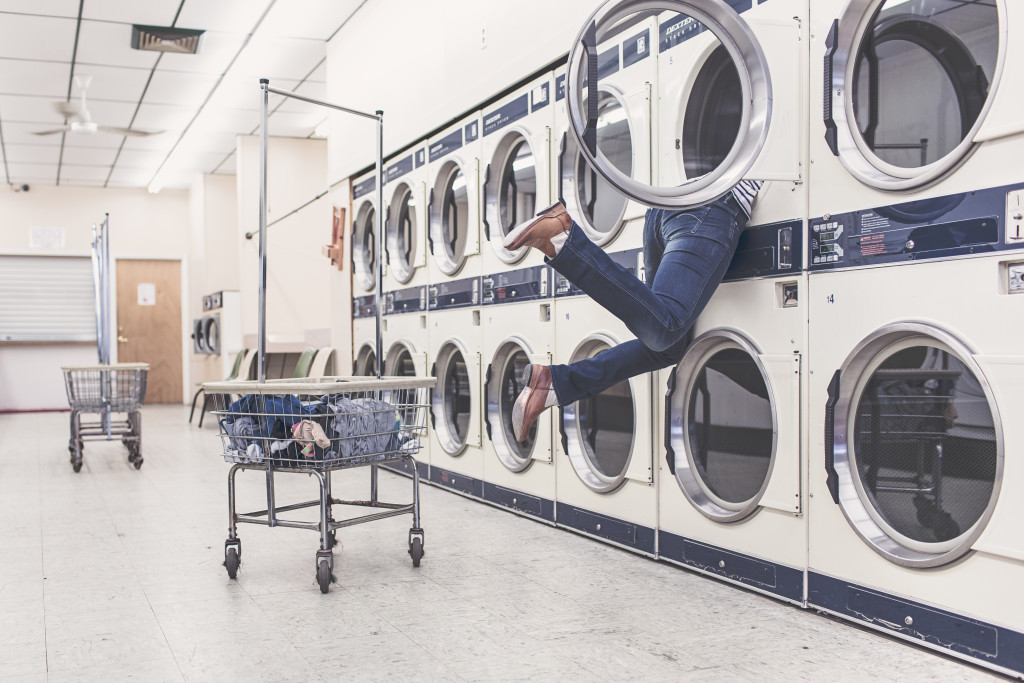Maybe you’ve heard this slogan: “we can’t get rich doing one another’s laundry.” It’s a sneer at low-skill jobs in the service sector and it is sometimes used to persuade governments to give special privileges to those who practice macho arts like manufacturing lest we be reduced to a nation of shopkeepers, or worse, dry cleaners.
It’s a catchy slogan, but it’s wrong. Fortunately, economists have taken this one on. A Google search for the phrase turned up this 2002 article by Russell Roberts in The Freeman. Heck, this mistake inspired Adam Smith to write The Wealth of Nations. Here I’ll show how we can get richer by doing one another’s laundry.
Consider two people, Juan and Carlos, who can do two things: they can wash towels or they can wash shirts. In an hour, Juan can wash four towels or twenty shirts because he has a very good washing machine. In an hour, Carlos can wash four towels or four shirts because he doesn’t have a washing machine.
Suppose they each spend half their day washing towels and half their day washing shirts. Juan washes two towels and ten shirts. Carlos washes two towels and two shirts. In total, they wash four towels and twelve shirts.
Then suppose they decide to do one another’s laundry. Juan completely specializes in washing shirts and outsources towel-washing to Carlos, and Carlos completely specializes in washing towels and outsources shirt-washing to Carlos. Between them, they now wash four towels and twenty shirts. They’re richer by eight shirt-washings.
On what terms will they agree to cooperate? For each towel he washes, Juan gives up the opportunity to wash five shirts. For each shirt he washes, he gives up the opportunity to wash 1/5 of a towel. For each towel he washes, Carlos gives up the opportunity to wash one shirt. For each shirt he washes, Carlos gives up the opportunity to wash one towel.
Juan is the low-cost washer of shirts: he has to give up fewer towel-washings to wash a shirt. Carlos is the low-cost washer of towels as he would only have to give up one shirt-washing to wash a towel whereas Juan would have to give up five.
Suppose they agree that Juan will wash two shirts for every towel Carlos washes. This is a good deal for Juan: now he only has to give up two washed shirts to have a towel washed. It’s also a good deal for Carlos: instead of getting only one washed shirt for every towel-washing he gives up, he now gets two. It’s clear: Juan and Carlos have gotten richer by doing one another’s laundry.
Suppose Juan and Carlos are located near Niagara Falls. Juan’s side is called “Canada” while Carlos’s side is called “The United States.” It’s still a good deal for Juan. It’s still a good deal for Carlos. Drawing an imaginary line between them and calling it a “border” doesn’t change anything. If we abstract away and focus not just on Juan and Carlos but on a group of Juans called “Canadians” and a group of Carloses called “Americans,” nothing changes. They both have more clean towels and more clean shirts.
Now suppose that instead of towels and shirts we’re talking about “cars” and “laundry services” flowing between “Canada” and “the United States.” Canada can produce four units of laundry services in an hour or twenty cars in an hour. The US can produce four units of laundry services in an hour or four cars in an hour. Now suppose they decide to specialize completely: Canada makes only cars, the US only does laundry, and they trade: Canada trades two cars for a laundry service, and the US trades a laundry service for two cars. Canada gets cheaper laundry as each laundry service now costs them only two cars instead of five. Americans have higher earnings: they could take an hour and make cars themselves and finish with four cars, or they could spend that time doing laundry for the Canadians and finish with eight cars.
For some reason people sneer at laundry and revere manufacturing. My state of Alabama has given lots and lots of special tax breaks and other incentives to car companies to get them to locate in Alabama. It isn’t at all clear that this was a better “investment” than (say) lowering taxes on everyone—people who own laundromats, for example.
When asked to name an idea in economics that is both really important and not obvious, the late Paul Samuelson said “comparative advantage.” Trade lets us live richer lives filled with great things like cars and air conditioning and harder-to-notice-but-still-important things like clean clothes. Speaking of which, if you’ll excuse me, I need to go see if my last load of laundry is finished.



